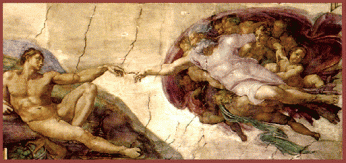The One Absolute Foundation
The Absolute Basics

'Creation of Adam' by Michelangelo
So what do we mean by “one absolute?” Well, Absolute is a philosophical concept that refers to a transcendent, unconditioned, ultimate reality (some people, in fact, use the term “Ultimate,” or “Higher Power,” but we prefer Absolute for reasons we will explain shortly). The Absolute is not a being; it is beyond attributes, names, or words, but it is the core essence of the reality we experience. Our understanding of it lends us purpose and helps us to meaningfully orient our lives. It need not be static, or even a thing, but can be dynamic, ever-changing, and eternal. In Eastern concepts, this is a term easily synonymous with the Hindu Brahman, the Buddhist sunyata , or the Tao. However, with western concepts the idea gets a little more complex as it treads on sensitive ground.
In Western contexts, “the Absolute” is, essentially, a term for Allah, God, or Yahweh (not that these are the same thing, though they refer to the same deity). However, these western notions tend to involve human traits being ascribed to a deity. For instance, God is often depicted with a beard, or with a perfect human physique. He is spoken of as all-powerful, all-knowing, or all-good, even as a he or she. All of these are attributes that the deity is thought to possess. However, in terms of “the Absolute”, the deity transcends such attributes. If we think of the western God as having two natures then this term, “the Absolute,” will become clearer. On the one hand, there is the “observable” nature of the deity. This is God’s attributes as described in Scripture, dogma, and belief. It is the aspects of God that are fathomable by the human brain and the human experience. On the other hand, there is the “essential” nature of the deity. This is the core of what God is, its essence, its actual being. This is beyond words, to the point of being both beyond conception and expression, though it is the aspect of the deity that is at the heart of what we experience. This is the true nature of God, beyond human conception, and is what we refer to when we use the term “The Absolute.”
If I have expressed this well, then it should be easy to see that “the Absolute,” as a concept, transcends the ideas of any one religion, and refers to a common core of religious and spiritual experience—how the deity or ultimate reality reveals itself to we humans, both within ourselves and in the world. Commonality is the notion here, as The Absolute can, for purposes of inter-faith dialogue, be a substitute for the power that is at the core of any faith (it could, for instance, even substitute for Natural Law for a scientist). The term “Ultimate” is often used instead, but this sometimes is used to refer to whatever serves as a goal, or organizing principle, for an individual—such as money, peace, love, or , in a negative connotation, a drug. The Absolute, as a concept, lies beyond this kind of notion. As well, the term “Higher Power” is often used as a faith-neutral term to refer to ideas like Allah, or God. But, it is also used to refer to powers beyond oneself, and can refer to other people, organizations, principles, or ideas. For this reason, again, we prefer the term The Absolute as it designates a reality and organizing principle beyond these things, at the heart of nature and existence itself.
If you still prefer the use of other terms, beyond when referring to those ideas specifically (like saying Allah is the name for the Islamic deity), feel free to do so. We are not here to make you, or ask you to, conform. But, for the purposes of dialogue, we do suggest the common term “The Absolute.”
In Western contexts, “the Absolute” is, essentially, a term for Allah, God, or Yahweh (not that these are the same thing, though they refer to the same deity). However, these western notions tend to involve human traits being ascribed to a deity. For instance, God is often depicted with a beard, or with a perfect human physique. He is spoken of as all-powerful, all-knowing, or all-good, even as a he or she. All of these are attributes that the deity is thought to possess. However, in terms of “the Absolute”, the deity transcends such attributes. If we think of the western God as having two natures then this term, “the Absolute,” will become clearer. On the one hand, there is the “observable” nature of the deity. This is God’s attributes as described in Scripture, dogma, and belief. It is the aspects of God that are fathomable by the human brain and the human experience. On the other hand, there is the “essential” nature of the deity. This is the core of what God is, its essence, its actual being. This is beyond words, to the point of being both beyond conception and expression, though it is the aspect of the deity that is at the heart of what we experience. This is the true nature of God, beyond human conception, and is what we refer to when we use the term “The Absolute.”
If I have expressed this well, then it should be easy to see that “the Absolute,” as a concept, transcends the ideas of any one religion, and refers to a common core of religious and spiritual experience—how the deity or ultimate reality reveals itself to we humans, both within ourselves and in the world. Commonality is the notion here, as The Absolute can, for purposes of inter-faith dialogue, be a substitute for the power that is at the core of any faith (it could, for instance, even substitute for Natural Law for a scientist). The term “Ultimate” is often used instead, but this sometimes is used to refer to whatever serves as a goal, or organizing principle, for an individual—such as money, peace, love, or , in a negative connotation, a drug. The Absolute, as a concept, lies beyond this kind of notion. As well, the term “Higher Power” is often used as a faith-neutral term to refer to ideas like Allah, or God. But, it is also used to refer to powers beyond oneself, and can refer to other people, organizations, principles, or ideas. For this reason, again, we prefer the term The Absolute as it designates a reality and organizing principle beyond these things, at the heart of nature and existence itself.
If you still prefer the use of other terms, beyond when referring to those ideas specifically (like saying Allah is the name for the Islamic deity), feel free to do so. We are not here to make you, or ask you to, conform. But, for the purposes of dialogue, we do suggest the common term “The Absolute.”

Photo by Monte Stevens
What do we mean when we say pluralism? This is another philosophical term, but this one is often seen quite differently then how we mean it here. When William James wrote about varieties of religious experience, he noted that at the core of religious experiences across varying religions were certain common, uniting experiences. This notion is at the heart of our usage of the term: pluralism. We believe that every religion, or system of faith, experiences The Absolute in similar ways—such as life-orienting and re-orienting revelation, or a deep and moving experience of awe.
Modern notions of pluralism involve the idea that every faith has a claim on truth, and that no faith is absolutely true above any others—that there are many paths up the mountain of enlightenment. This is commonly seen to mean that there is no ultimate truth. And this is where we disagree. There is an ultimate truth, an ultimate reality; it is, in fact, The Absolute itself. However, how does one express this truth in words? We do not know. But, we do believe that this truth can be experienced in communion and dialogue with each other—even if it can never be codified. This is, of course, why we wish to form and promote this community, The One Absolute Foundation. In our terms, there are many paths up the mountain that lead to an appreciation and life-orienting experience of The Absolute. There is no wrong path; there is not just one path. In fact, there is not just one mountain. Each faith is its own mountain, but they are all under one sky—The Absolute. It is this sky that we wish to connect with in our dialogues with one another.
Some call this notion “universalism.” We suggest that “universalism” and “pluralism” are nearly interchangeable. However, universalism often means different things depending on the faith that is using the term (such as Christian Universalism). We wish to distance ourselves from the use of the term in this way, and, therefore, prefer the term pluralism.
Modern notions of pluralism involve the idea that every faith has a claim on truth, and that no faith is absolutely true above any others—that there are many paths up the mountain of enlightenment. This is commonly seen to mean that there is no ultimate truth. And this is where we disagree. There is an ultimate truth, an ultimate reality; it is, in fact, The Absolute itself. However, how does one express this truth in words? We do not know. But, we do believe that this truth can be experienced in communion and dialogue with each other—even if it can never be codified. This is, of course, why we wish to form and promote this community, The One Absolute Foundation. In our terms, there are many paths up the mountain that lead to an appreciation and life-orienting experience of The Absolute. There is no wrong path; there is not just one path. In fact, there is not just one mountain. Each faith is its own mountain, but they are all under one sky—The Absolute. It is this sky that we wish to connect with in our dialogues with one another.
Some call this notion “universalism.” We suggest that “universalism” and “pluralism” are nearly interchangeable. However, universalism often means different things depending on the faith that is using the term (such as Christian Universalism). We wish to distance ourselves from the use of the term in this way, and, therefore, prefer the term pluralism.
